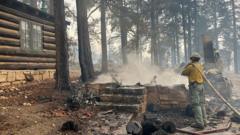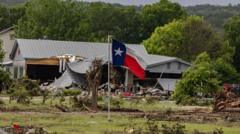As Canada faces a severe wildfire season, the devastating impact in Manitoba serves as a stark reminder of the urgency in tackling climate change.
Canada’s Wildfire Season Begins with Tragic Loss of Life

Canada’s Wildfire Season Begins with Tragic Loss of Life
Wildfires in Manitoba lead to two fatalities as temperatures soar in the province, signaling a worrying start for this year's fire season.
In a tragic turn of events, a wildfire in Manitoba has claimed the lives of two individuals in the town of Lac du Bonnet, marking a sorrowful kickoff to Canada's wildfire season. The deceased, a man and a woman, were found trapped in an area already under a mandatory evacuation order as the fire rapidly escalated. Premier Wab Kinew expressed deep sorrow, stating that the news transformed an emergency situation into a profound tragedy.
The wildfire, which has spread over approximately 10,000 acres, has led to the evacuation of around 1,000 residents from Lac du Bonnet and its surroundings. Mayor Ken Lodge noted the shock felt by the community as they grapple with the unprecedented speed and intensity of the flames.
Simultaneously, Manitoba is experiencing an intense heat wave, with temperatures soaring to a record-breaking 37 degrees Celsius (99 degrees Fahrenheit) in Winnipeg. As authorities continue to investigate the fire's origins, they have warned that conditions may worsen. The federal government anticipates that additional lightning-induced fires may emerge across British Columbia and the prairies as warm, windy weather persists.
Historically, Canada's fire season peaks between May and September, but the last two years have shown extreme variability. Previously, 2023 saw a staggering record of over 6,000 wildfires across the nation, devastating millions of acres and contributing significantly to global carbon emissions, as reported by researchers. Currently, around 100 wildfires are active nationwide, contesting crews across various provinces.
In Manitoba, firefighters are facing challenges battling five significant out-of-control blazes. However, forecasts of rain could provide some relief, a welcomed change on a typically festive holiday weekend celebrating Queen Victoria's birthday. Premier Kinew voiced hope for rain to aid firefighting efforts, emphasizing the community's need for support from the weather.
As wildfires rage in Canada, the dire situation highlights the essential need for proactive measures against climate change and increased investment in disaster preparedness to protect vulnerable communities.
The wildfire, which has spread over approximately 10,000 acres, has led to the evacuation of around 1,000 residents from Lac du Bonnet and its surroundings. Mayor Ken Lodge noted the shock felt by the community as they grapple with the unprecedented speed and intensity of the flames.
Simultaneously, Manitoba is experiencing an intense heat wave, with temperatures soaring to a record-breaking 37 degrees Celsius (99 degrees Fahrenheit) in Winnipeg. As authorities continue to investigate the fire's origins, they have warned that conditions may worsen. The federal government anticipates that additional lightning-induced fires may emerge across British Columbia and the prairies as warm, windy weather persists.
Historically, Canada's fire season peaks between May and September, but the last two years have shown extreme variability. Previously, 2023 saw a staggering record of over 6,000 wildfires across the nation, devastating millions of acres and contributing significantly to global carbon emissions, as reported by researchers. Currently, around 100 wildfires are active nationwide, contesting crews across various provinces.
In Manitoba, firefighters are facing challenges battling five significant out-of-control blazes. However, forecasts of rain could provide some relief, a welcomed change on a typically festive holiday weekend celebrating Queen Victoria's birthday. Premier Kinew voiced hope for rain to aid firefighting efforts, emphasizing the community's need for support from the weather.
As wildfires rage in Canada, the dire situation highlights the essential need for proactive measures against climate change and increased investment in disaster preparedness to protect vulnerable communities.


















